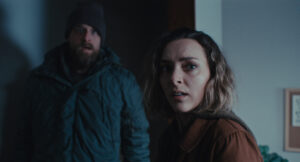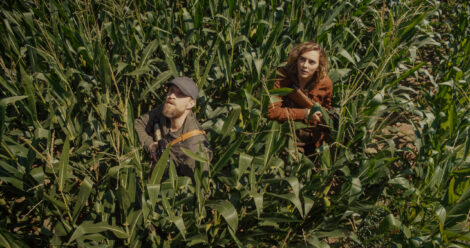There are two ways for films to handle time travel. The first is to firmly establish rules which are tightly wound like a pocket watch and let us marvel at how everything fits together and how every rule is obeyed. The second treats time travel as a sauce to accentuate the themes and characters. In today’s plot obsessed culture there are usually more rewards for the former than the latter. This past week CADDO LAKE came out to mostly positive review and chatter because it adopts the pocket watch approach. However, when I watched it I found myself unengaged. It was pretty enough, but a movie that requires an insert shot of a printout of 100 years of historical water table levels is too busy litigating its own rules to make me feel anything.
Michael Felker’s THINGS WILL BE DIFFERENT takes the opposite approach. It never bogs the viewer down in navigating boring expository dialogue. There are no rewards here for being a rules lawyer. Felker has spent much of the last decade collaborating with Aaron Moorhead and Justin Benson. Benson and Moorhead’s work has been more occupied with the emotional weight of their sci-fi conceits. Felker has served as editor on their best, performing multiple effortless sleights of hand. His editing expertly disguised the films’ budgets and kept characters prioritized above effects moments.
Fully in the driver’s seat Felker listens to the same instincts, prioritizing brother Joseph (Adam David Thompson) and sister Sidney (Riley Dandy). Their rapport is easy, familiar. There’s an early moment where they’re discussing their shared childhood and the wounds from childhood bubble to surface. Sidney interrupts a painful recollection from Joseph and says, “the deal was you remember mom. I remember dad.” Dialogue reveals to us this deal was made because each of them has positive, loving memories of one parent. They’re co-regulating ignoring their own trauma. Very quickly the audience gets a sense that Joseph and Sidney need each other but have held each other at arm’s length. Opening voice over of a call details that they’ve been estranged but Joseph has gotten in touch with Sidney for one last score. There’s a bit of perfunctory dialogue in a diner where they meet about the safe house they’re going to use and then we’re off to the races.
The safe house that Joseph has secured for them to use allows for them to step out of time. No one will be able to follow them where they go and the trail will run cold for law enforcement and the wronged. All they need to do is lay low in this pocket of time for two weeks. Knowing that they love each other, have been drifting apart, and have unprocessed baggage from their shared youth, the hook becomes apparent. The money is pretext. It’s an excuse to be together and not able to run away at the slightest discomfort. These are siblings so estranged that it takes robbery and time travel to bring them back together. Much of the first act is confined to getting used to the dynamic between them and becoming acclimated to the farmhouse that has a closet that can skip out of time. While the film does use needle drops it does so sparingly, preferring instead to let the audience stew in the ambient sound of the farm and silences that crop up between brother and sister in conversation.

It’s at the beginning of the second act that everything goes to hell. Shortly before they’re scheduled to go back to their own time. An etched board nailed across the entrance to the closet warning them to go the mill on the property shakes everything up. Joseph and Sidney are being vaguely observed by whoever controls the time dynamic. They’re told with a tape recorder passed back and forth in time that they are to be erased. In panic, they ask what they can do to avoid their own deaths. The mysterious presence tells them that someone will come to the farm who shouldn’t be there. If they kill this person they can leave.
What happens next is great since the film is more interested in characters than winding the pocket watch of plot. Joseph and Sidney spend a full year waiting for someone to show up. It wears on them, and the natural resentments they were hoping to paper over with two weeks together become exacerbated by a year together under pressure. They start to turn on each other and out come the cruel accusations.
I won’t describe any of the plot mechanics of the third act, but it’s all entirely driven by these characters we’ve come to care for. Thompson and Dandy are so good as these characters that this two-hander never feels small. Felker’s tight editing and first time cinematographer Carissa Dorson’s careful blocking keep the film feeling fast and visually engaging. It’s easy to ask with film constrained to a few locations with a limited number of actors, “why isn’t this theater?” This film repeatedly makes the case for itself.
So should you spend time with THINGS WILL BE DIFFERENT? If there’s a member of your family you’ve longed for an excuse to reconnect with you’ll find something here. If austere country architecture and empty fields chill you and draw you in, then yes. And if you will always love characters more than someone explaining a “temporal pincer movement” than you owe it to yourself to feel this film’s beating heart.
Tags: Aaron Moorhead, Adam David Thompson, Caddo Lake, Carissa Dorson, Justin Benson, Michael Felker, Riley Dandy, Things Will Be Different, Time Travel



No Comments